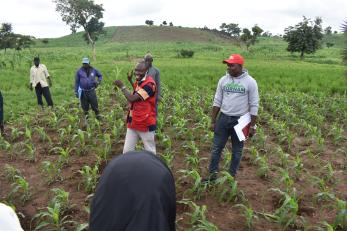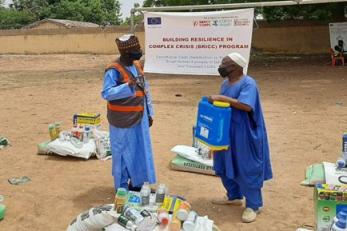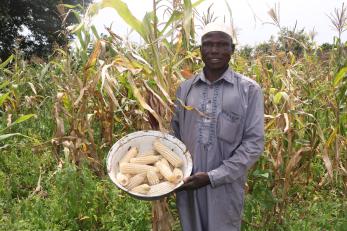Transforming Northeast Nigeria through innovative agricultural interventions

From the harsh fallouts of climate change to the grim effects of violent conflicts, farmers in Northern Nigeria face serious and often life-threatening challenges that impact their lives and livelihoods. Agriculture has been cited as the dominant sector providing a livelihood for many households in Nigeria, particularly in rural areas where it employs almost 84% of households and accounts for 56 percent of rural net income. It is critical that social interventions in Northern Nigeria continue to address these challenges towards sustaining the income of vulnerable families dependent on this sector. Attending to the plight of farmers is one of the major ways to achieve sustainable progress for conflict-affected communities in the North, beyond any emergency humanitarian assistance that can be offered by government, development organizations, and other stakeholders.
Mercy Corps Nigeria, a leading international non-governmental organization operating in Nigeria prioritizes agriculture as part of its strategy for building the resilience of people in communities where it operates. Having studied and identified many of the challenges that contribute to pervasive poverty among rural farmers which have been exacerbated by conflict and the impact of climate change, the organization addresses these challenges through various targeted interventions. The interventions are designed to empower the farmers to earn higher income and achieve a better quality of life through improving their knowledge base and farming techniques.
The interventions include the European Union-funded Building Resilience in Complex Crisis (BRICC) program being implemented by Mercy Corps and its partners, Danish Refugee Council (DRC), and Cooperazione Internazionale (COOPI). The three-year program which began in April 2019 is focused on building the resilience of vulnerable members of 30 target communities within six LGAs of Yobe State that have suffered the effects of conflict, climate change, and other crises - Damaturu, Potiskum, Geidam, Yunusari, Gujuba, and Gulani. Many farmers in these communities have experienced notable challenges such as being displaced from their homes and farms by conflict, living under the threat of violence, and suffering diminished productivity due to harsh weather conditions worsened by climate change.
To help farmers cope better and thrive in these tough circumstances, the program provides training on agricultural techniques and practices such as the production of fertilizers, animal fattening, irrigation techniques, etc. BRICC also supports farmers through cash transfers to restore and improve livelihoods. Based on increasing evidence, the benefits of the program are real. Babura Mai Shago, a 55 years old farmer who was able to start over in Kolori community after he and his family were displaced by insurgency, is one of the happy beneficiaries of the program.

“BRICC has enabled me to acquire in-depth knowledge of producing simple compost manure and modern farming practices. I can now cultivate crops and rear animals at the same time using minimal capital. This has improved my livelihood and also brings about a source of income to me,” he enthused.
Following the support he received through BRICC, Babura has established a farm measuring about 1.5 hectares which has significantly improved his capacity to provide for his family’s needs even in the conflict-plagued community that he lives in.
Another impactful Mercy Corps initiative that has helped to build farmers’ resilience is Agricultural Livelihood and Market Recovery Intervention (ALMRI) program, implemented in Borno State and funded by the European Union and the German Federal Ministry for Economic Cooperation and Development (GIZ). ALMRI boosted the livelihoods of 4,500 smallholder farmers in Southern Borno by training them on improved farming techniques, strengthening agricultural supply and distribution chains; and providing inclusive financial services.
In each community where ALMRI was implemented, it employed a unique system where a number of farmers were selected for training on good agricultural practices and business skills, after which they were designated to train other farmers in their communities. As part of the training program, model farms are set up for practical sessions and demonstrations.
The concept of empowering many farmers in a community by leveraging on the capacity of a pioneer group of trainees exemplifies Mercy Corps’ signature approach of developing strong collaborations with members of communities where it implements interventions. Through such initiatives, Mercy Corps empowers people to help develop their own communities.
“Not all of us into farming are very good at it. I am happy with the fact that I can do something on my farm and other people can learn from it. Secondly, It always provides me with the income to educate my children,” shared Adamu Salihu, one of the lead farmers who participated in the ALMRI program.

Through ALMRI, Mercy Corps also partnered with the Borno State Agricultural Development Program (BOSADP) to utilize its network of agricultural extension agents who were trained and linked to the rural farmers benefiting from its interventions. These agents were then able to provide hands-on support to farmers on how to use fertilizers, herbicides and provide solutions to combat diseases that hamper productivity and reduce yield.
Furthermore, Mercy Corps provided support to Contec Global Agro Limited, a company that develops a wide range of organic farming products, to boost its supply and distribution systems to improve farmers’ access to critical inputs for planting, cultivating, and harvesting.
In recent years, Mercy Corps has implemented various other programs to support farmers in Northern Nigeria using approaches that reflect the peculiarities of each community/region as well as useful techniques required for agriculture to thrive amidst specific crises.
Another innovative program is the USAID-funded Feed the Future Nigeria Rural Resilience Activity which supports small-holder farmers through various initiatives such as an end-to-end digital platform that provides real-time advice to farmers and helps them to manage their farm portfolio; market linkages for the purchase of inputs and sale of produce, among others.
Also notable is the erstwhile Borno Agricultural Development Initiative (BADI) project, through which Mercy Corps supported farming households with market linkages, development of market systems for quality seeds and other agricultural inputs. The program also provided much-needed training in various areas including the production of seeds, crop protection products, as well as soil-adapted, bio-based fertilizers to replace inorganic fertilizers which have been outlawed in the North due to violent crises there. Thanks to BADI, many farmers have also been trained to adopt dry season farming to complement the more popular North-Eastern Nigerian culture of rainy season farming which is troubled by unpredictable rainfall—a fallout of climate change.